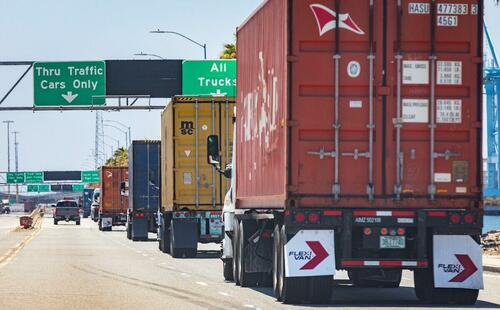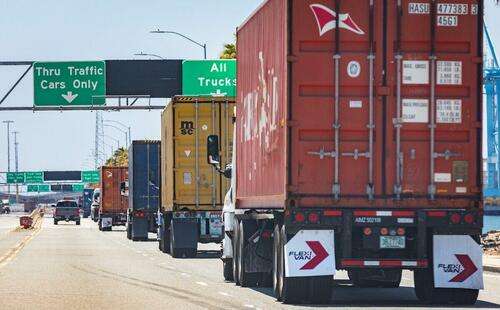Authored by Travis Gillmore via The Epoch Times (emphasis ours),
Logistics companies are scrambling to meet California’s upcoming Jan. 1, 2024 mandate that all new trucks purchased for servicing ports, rail yards, and distribution centers in the state be zero-emission vehicles, with experts questioning limited access to charging stations and the viability of switching from diesel to electric fleets.

Availability of electric semi-trucks is a concern, as is the price of the vehicles, the number of miles they can go on a charge, and the cost of maintenance and replacement parts, all of which currently remain unknown variables, according to industry experts.
“We need to know all of these things in order to plan,” Nelson Sibrian—owner of Sibrian Trucking based in Wilmington, California—told The Epoch Times. “If we don’t know the actual range, it makes it impossible to schedule, and they can’t give me a straight answer on how long [trucks] will take to charge.”
Charging is problematic on several fronts, as trucks require special charging stations, and with limited infrastructure at and near ports, experts say the frequent need to recharge, and the wait times expected with more trucks than charging ports, add to the time and cost of operation.
Traditionally, maintenance accounts for the majority of expenditures with diesel trucks, and the lack of information regarding similar requirements for electric vehicles presents unique challenges for logistics companies, according to experts. Some say they’ve heard costs could be tenfold for electric as compared to diesel trucks.
“Nobody has real numbers when we ask for details about maintenance and replacement costs,” Sibrian said. “With diesel, we know our cost per day to maintain the vehicle.”
Entry Price Substantially Higher for Electric Vehicles
The price of most electric semi-trucks is approximately $500,000, based on listings for new models, and Tesla is seeking to gain market share by undercutting the price, with models ranging from $180,000 and up.
Availability is considerably different between electric and diesel. Fleet owners have their choice of manufacturers for traditional trucks, while extremely limited production has electric counterparts on backorder in many instances.
“Even if I had the $500,000 to buy a new electric truck, there aren’t any for sale,” John Williams, a trucking professional servicing Oakland ports, told The Epoch Times.
With 10,000 drayage trucks—those that access ports and railyards—reportedly replaced on average each year, the newly imposed mandate will create demand that manufacturers will be unable to supply, based on current production standards, according to trucking company owners. Distributors additionally say only a handful of trucks are available at a time, with supply substantially trailing demand.
Efforts are underway to increase production at facilities in Southern California and Nevada, but transportation professionals expect difficulty buying or leasing the trucks by the time the laws take effect.
“This is a bigger problem than people realize because we’re being forced to do something that is literally impossible,” Williams said. “There are not enough trucks, not enough charging stations, and not enough information that we can rely on.”
Weight and Range Limitations Could Impact Profitability
Industry experts say the estimated 10,000-pound battery pack installed in Tesla trucks is also potentially an issue because replacements would be difficult and costly and lead to less cargo being carried due to laws pertaining to weight limits. They additionally report no success when requesting details from the manufacturer regarding specifics.
Read more here…
